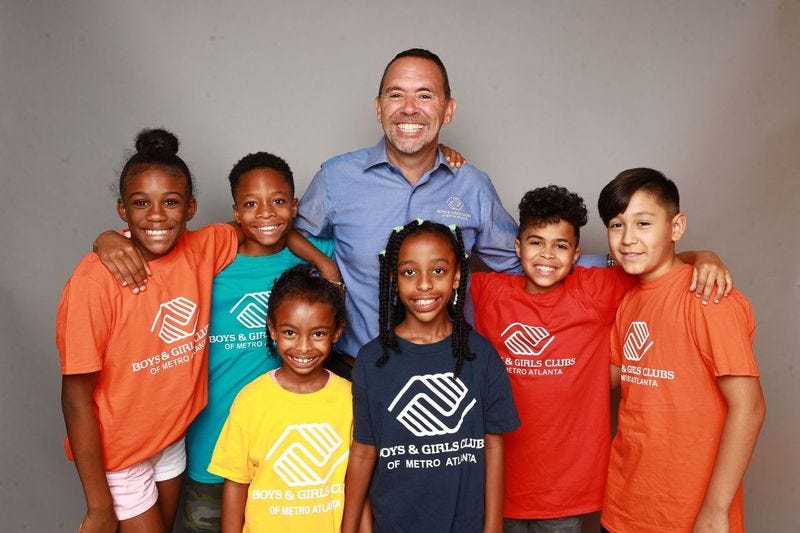Beyond the Classroom: Lessons in youth development from Atlanta education visionary David Jernigan
A journey towards better living
David Jernigan is one of my Atlanta professional heroes. He’s the President & CEO of Boys & Girls Clubs of Metro Atlanta, where he oversees 25 Clubs across 10 counties. During his more than 20 years in youth development, David has served as Deputy Superintendent for Atlanta Public Schools, Executive Director for KIPP Metro Atlanta Schools, and Founding Principal of KIPP WAYS (West Atlanta Young Scholars).
David volunteers as an alum of Leadership Atlanta and currently serves on the KIPP Metro Atlanta Schools Board of Directors, Hands on Atlanta Advisory Council, and the UNC Alumni Association Board of Directors.
By the way, we’re putting out short-form video snippets on both Instagram and YouTube. If you haven’t yet, will you throw us a follow?
-
David Jernigan conversation overview:
It was a highly pragmatic conversation. David and I discussed the current challenges facing youth, including mental health and the challenges of technology. He views AI as a promising tool for education but sees limitations to keep in mind.
We covered the importance of maintaining a culture of excellence in education, balanced with nurturing support.
We need great people to make the system work, which points to a need for increased investment in education, particularly in teacher compensation (though he isn’t necessarily a fan of merit-based pay for teachers).
David shared his leadership journey and his advice for young leaders on finding a balance between striving for excellence without burning themselves and their teams out.
Finally, we covered why Atlanta is a city brimming with opportunity and what makes it such a compelling and challenging city for leaders in education.
Please find the episode linked below:
-
🧠 Big Question:
Will AI be the great equalizer in education, or just another way for privileged children to get ahead?
David’s answer is “yes, and.” He acknowledges the potential of AI as a personalized, always-available tutor, adapting to each student's needs.
However, he also appreciates concerns that as AI becomes ubiquitous, access to human interaction might become the new differentiator. Remember when having a computer at home was the big divide? Now it might be about who gets face time with actual teachers.
He recalls his mom’s worry that he’d never learn math because of calculators. His view is that technology might be an increasingly effective tool, but the most important contributor to a child’s learning is still a caring, competent adult who is actively invested in helping kids learn.
I think this is is important for all of us to remember, especially those of us on parenting journeys as we contemplate screentime. The most compelling takes I’ve heard suggest that the most important thing isn’t whether your kid does or doesn’t watch Daniel Tiger, but that you’re there to discuss it and ask what they learn.
-
💡 Bold Idea:
Rather than completely overhauling the education system, we should focus on being brilliant with the basics.
I pressed David whether, in light of depressing educational attainment and mental health statistics, our entire educational system might need an overhaul. He advocates for a more pragmatic approach.
He reflects on the success factors from his time founding KIPP Ways: highly motivated teachers, high standards of excellence, belief in students' abilities to meet uncommon challenges, and consistent exposure to diverse experiences and role models.
This approach stands in contrast to more radical reform ideas, including those espoused by Moonrise founder Chris Turner on this podcast.
I notice that the perspectives I’m often drawn to are those pushing bold claims about need for big reforms, so it was notable to hear such a thoughtful leader take a more measured stance. That doesn’t mean that being brilliant with the basics is easy, but striving for more equitable access to well-executed educational models feels like a goal worth pursuing.
-
🎯 Better Living
Sustained excellence requires embracing the seasonality of leadership.
David shared stories of more than 100 straight days when you could find his car in the office parking lot, often working 16+ hour days.
As a leader he was talking about self-care, but then role modeling a ‘power through at all costs’ mentality.
He didn’t recognize the unsustainability of this approach until he had forced downtime between jobs during the pandemic and the increased self-awareness that came from sharing life with a romantic partner.
We discussed the tricky balance where successful leaders can sometimes look back and cite the need for more balance — but would they have reached those heights without the grind?
David doesn't apologize for his hard work, and he's not sure he'd do it differently. But he does have some advice: think about leadership in seasons.
If you’re chasing greatness, you’ll have periods of less balance where you’re pushing into the red. But that can’t be every week, every season, or you’ll burn out. We need times of pushing hard and times of easing off, whether that's over a few week stretch or over years.
I’m entering a period of time where I’m sprinting a bit harder at work than I have been recently. David’s example reminds me that being aware and modulating our energy can help us access a wellspring of energy that ultimately leads to greater long-term effectiveness.
-
—
Questions for reflection:
For parents: What qualities do you prioritize when considering educational options for your children, and why?
For leaders: How do you monitor and manage the intensity of your work seasons? Do you have support systems or practices in place to help you maintain a sustainable approach to leadership?
-






